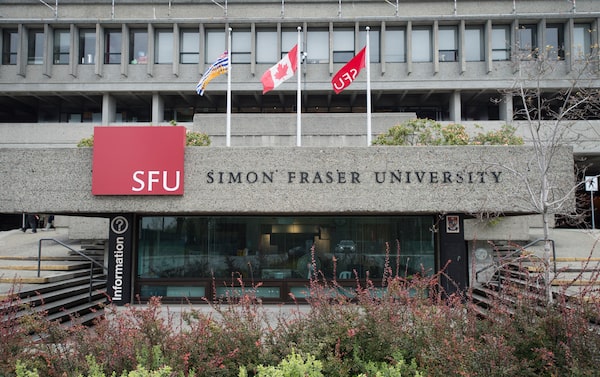Kelvin Gawley is a labour studies student at Simon Fraser University in British Columbia and a volunteer with Contract Worker Justice @SFU.

Simon Fraser University employees collect vacation pay during winter break, but each semester the school's food service workers get laid off.JONATHAN HAYWARD/The Canadian Press
Students, staff and faculty at Simon Fraser University were eagerly awaiting winter break but some of the school’s hardest-working people were dreading it.
SFU employees will collect vacation pay as they relax and recharge. Meanwhile, most of the workers who prepare and serve food on campus will be unemployed, without income and hoping they have a job come January.
At the end of each semester, food service workers at SFU get laid off. Many lose their jobs for the entire summer break.
There were even more layoffs during pandemic shutdowns. SFU stood by as its food service contractor – Chartwells Canada, a subsidiary of Compass Group, a multibillion-dollar multinational – dismissed most of its on-campus employees in 2020. Those who remained employed by Chartwells to feed students living on campus were subjected to intolerable workloads and unacceptable COVID-19 risks because of understaffing.
Cleaning workers, whose labour SFU buys from another broker, Best Service Pros, have been subjected to similarly appalling conditions throughout the pandemic.
These conditions are not normal. British Columbia’s two other large research universities operate their food and cleaning services in-house and treat workers better than their SFU colleagues by every objective measure. The University of British Columbia and the University of Victoria pay food and cleaning workers more, give them more sick and vacation days, provide better health and dental benefits, and top up parental employment insurance, unlike SFU.
UBC and Victoria don’t lay off food workers between school terms, and they avoided mass layoffs during the pandemic by assigning alternative work.
SFU shows contract workers it doesn’t consider them part of the school community by denying them access to the library, barring their children from on-campus daycare and refusing to grant them the same tuition discounts enjoyed by faculty members.
When the school surveyed faculty and staff in 2019 to measure its progress on equity, diversity and inclusion using a “diversity metre,” it excluded food and cleaning workers, the majority of whom are women of colour, because they were not employees. It was just another reminder that they literally don’t count.
Contract Worker Justice @SFU, a growing coalition of workers, union activists, students, staff and faculty, is demanding SFU president Joy Johnson employ support workers directly.
Less than two years since its launch, CWJ has secured a series of victories.
Last year, the university hired an outside firm to study the prospect of in-sourcing contract workers.
Dr. Johnson has also said SFU would also consider improving “educational opportunities” and access to campus facilities, and finding “other ways to enhance inclusion for contract workers as members of our campus community.”
This past summer, the school also announced it would “begin taking steps” to become a certified “living wage employer.” According to Living Wage for Families BC, a two-child, two-parent family in Metro Vancouver needs both adults to make $24.08 an hour while working full time to afford the basic necessities of life.
If SFU wanted to become a living wage employer today, it would have to give all of its contract workers a sizable raise, but it has only committed to pushing Chartwells and Best Service to increase wages when it renegotiates expiring contracts over the next three years. If the companies do commit to paying a living wage, SFU won’t be able to control what the companies do to maintain their profit margins when their labour costs increase, although evidence suggests the contractors will further understaff, overwork and exploit workers.
CWJ welcomes the moves SFU has made but there is only one way to stop the callous layoffs, poverty wages and paltry benefits. Dr. Johnson can only “enhance inclusion” of contract workers by removing the barriers between them and the institution.
SFU needs only follow the lead of UBC, Victoria and the provincial government, which has finally brought custodial and dietary workers in B.C. hospitals back in-house.
If the university is truly committed to equity, diversity and inclusion, which Dr. Johnson says is her top priority, the school must make SFU more equitable, diverse and inclusive by committing to ending outsourcing in 2023.